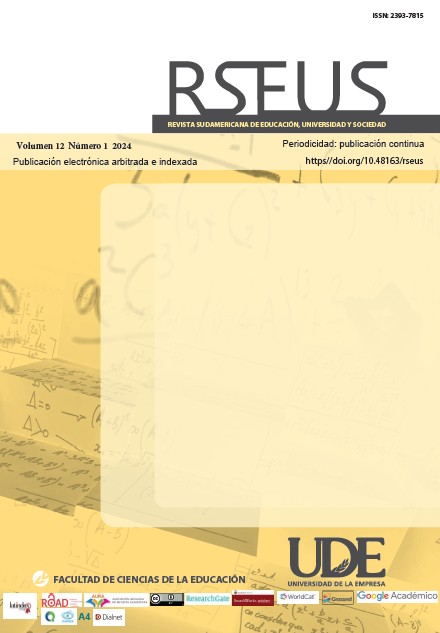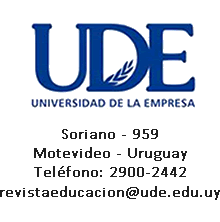ANALIZANDO LA CULTURA JUVENIL Y LLEVANDO PREGUNTAS PARA LA EDUCACIÓN
ANALIZANDO LA CULTURA JUVENIL Y LLEVANDO PREGUNTAS PARA LA EDUCACIÓN
Keywords:
Cultura Juvenil, Escuela tradicional, CULTURA JUVENILAbstract
This article is part of a PhD research entitled "Youth culture and military culture: encounters and disagreements in high school education", by the Center for Multireferential Biographical Studies in Education (CEMBE/UDE), directed by Prof. Dr. Charlie Palomo. The presentation in this article, which focuses on youth culture, shows an essential part of the conceptual framework of the doctoral thesis. In principle, it is pointed out that youth culture is not unique and homogeneous. The boys form subgroups with their own identity, style, configuration, liturgies... Rappers, graffiti artists, funk artists, taggers, punks, samba dancers, forrozeiros, they are not the same, therefore, considering and treating them uniformly is a first source of conflict detected. It is presented as a necessary starting point, to recognize their own identity and study them as lifestyles. They have their daily practices based on explicit and implicit principles, they contain their values that should be recognized, valued and respected. They have their forms of entertainment or hobbies. They choose and cultivate their own routes of knowledge appropriation. The various generations born and raised in the digital world approach and use technologies in a different and particular way. These, among other characteristics, make up a complex profile to which education can hardly give a single and simple answer, valid for everyone. And this is the axis of the deepening that is exposed here and that will be carried out, later, in the form of questions for education.
Downloads
References
CNPQ. Conselho Nacional de Desenvolvimento Científico e Tecnológico. (2024). Currículo do sistema de Currículos Lattes. Buscar Currículo Lattes. Brasil. https://buscatextual.cnpq.br/buscatextual/busca.do
CNPQ. Conselho Nacional de Desenvolvimento Científico e Tecnológico. (2024a). Currículo do sistema de Currículos Lattes. Informações sobre o PhD Juarez Tarcisio Dayrell. Brasil. http://buscatextual.cnpq.br/buscatextual/visualizacv.jsp?id=K4783888Y1
Dayrell, J. (2003). Cultura e identidades juveniles. Última Década, Nº 18, pp. 69-91. https://www.scielo.cl/scielo.php?script=sci_arttext&pid=S0718-22362003000100004
FERREIRA, A. B. de H. (2004). Novo Aurélio século XXI: o dicionário da língua portuguesa. Curitiba: Editora Positivo, 2120 p.
GIL, A. C. (2002). Como elaborar projetos de pesquisa. 4. ed. São Paulo: Atlas.
Mateus, I. (2017). Didática. Organização de Sebastião Luiz Batista, Maria de Fátima Andrade Costa Henriques. Serra, ES: Centro de Ensino Superior Fabra. https://soufabra.com.br/repositorio/biblioteca/livros/Livro%20Didatica.pdf
MEC. Ministério da Educação. (2024). Cultura juvenil na escola. Brasil. http://portal.mec.gov.br/seb/arquivos/pdf/cult_juvenil.pdf
Neumann, L.; e Mallmann, L. (2015). A relação de gerações baby boomers, x, y e z em uma organização prestadora de serviços. La Salle Estrela – Revista Digital, v. 1. n. 3. p. 87-128. https://www.unilasalle.edu.br/uploads/files/9cfbf209c278bc6dd10f0e4039b29e92.pdf
Pessin, G.; Guimarães, D. N.; Istoe, R. S. C.; André, B. P.; Tavares, L. C. C. (2012). Juventudes e suas linguagens: o que a escola tem a ver com isso?. https://vest.saocamilo-es.br/midias/documentos/hotsite/congressoposgraduacao/2013/submissoes/6343ab84fb5b2684332cba67e7075a6dd6569b79.pdf
SARKIS, S. M. de J. S. (2019). Valores Éticos da Cultura Militar e sua influência no desempenho dos alunos do Sistema Colégio Militar do Brasil. Dissertação de Mestrado. Faculdade de Educação. Universidade de São Paulo. https://teses.usp.br/teses/disponiveis/48/48134/tde-14052019-122606/publico/DISSERTACAO_REVISADA_2.pdf
Schlickmann, L.; Schmitz, L. (2015). Da escola tradicional à escola contemporânea: algumas considerações sobre a constituição do espaço escolar. In: Anais da 6º SEMIC do Curso de Pedagogia da FAI Faculdades. http://faifaculdades.edu.br/eventos/SEMIC/6SEMIC/arquivos/resumos/RES27.pdf
SOUSA, A. S. de; OLIVEIRA, G. S. de; ALVES, L. H. (2021). A pesquisa bibliográfica: princípios e fundamentos. Cadernos da Fucamp, v.20, n.43, p.64-83 https://revistas.fucamp.edu.br/index.php/cadernos/article/view/2336
UB. Universitat de Barcelona (2024). Nuestra historia/ Más de cinco siglos de historia. Espanha. https://web.ub.edu/es/web/la-nostra-historia
U.PORTO. Universidade do Porto (2024). Sobre a U.Porto - História. Portugal. https://www.up.pt/portal/pt/conhecer/sobre-a-uporto/historia/
UFMG. Universidade Federal de Minas Gerais. (2024). A Universidade. Brasil. https://ufmg.br/a-universidade/
Zaninelli, T.; Caldeira, G.; e Fonseca, D. L. S. (2022). Veteranos, Baby Boomers, Nativos Digitais, Gerações X, Y e Z, Geração Polegar e Geração Alfa: perfil geracional dos atuais e potenciais usuários das bibliotecas universitárias. Brazilian Journal of Information Studies: Research trends, vol. 16. https://revistas.marilia.unesp.br/index.php/bjis/article/view/12991

Downloads
Published
How to Cite
Issue
Section
License
Copyright (c) 2024 LAURO MELLO

This work is licensed under a Creative Commons Attribution 4.0 International License.
Política para revistas de acceso abierto
Los autores/as que publiquen en esta revista aceptan las siguientes condiciones:
a. Los autores/as conservan los derechos de autor y ceden a la revista el derecho de la primera publicación, con el trabajo registrado con la licencia de atribución de Creative Commons (CC-BY), que permite a terceros utilizar lo publicado siempre que mencionen la autoría del trabajo y a la primera publicación en esta revista.
b. Los autores/as pueden realizar otros acuerdos contractuales independientes y adicionales para la distribución no exclusiva de la versión del artículo publicado en esta revista (p. ej., incluirlo en un repositorio institucional o publicarlo en un libro) siempre que indiquen claramente que el trabajo se publicó por primera vez en esta revista.





















